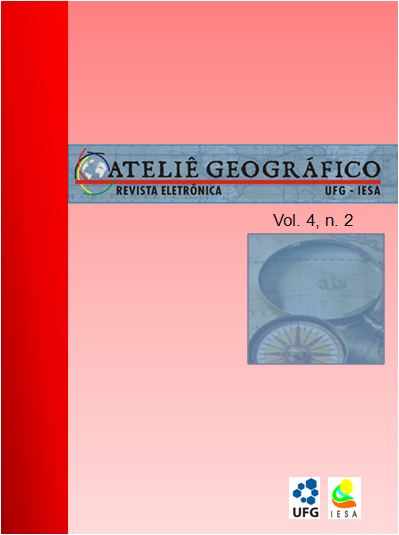THE CONCEPT OF TERRITORY AND THE FETISHISM OF POWER
DOI:
https://doi.org/10.5216/ag.v4i2.9914Abstract
This paper depicts the relationship between the concepts of territory and power. Initially we presented the authors who have devoted themselves to discussing the concept of territory, which seems to be an emanation of power. We understand such interpretation as fetishism of power. Fetishism can be defined as the loss by individuals of their control over the actions and the products of their creation. In fetishistic consciousness the products become the creators. To overcome the fetishism of power, we distinguish between authoritarian areas (mediated by power) and libertarian territories (mediated by collectivism, solidarity and equality). We found that the authoritarian territories are normally trivial in our society while libertarians only exist in times of challenge to the capitalist society. We also demonstrated that the relationship between power and territory can not be understood as unequivocal or necessary, but only as historical and transitory. In the same way it was produced historically, it can be overcome throughout the history.Downloads
Download data is not yet available.
Downloads
Published
2010-05-13
How to Cite
MAIA, Lucas. THE CONCEPT OF TERRITORY AND THE FETISHISM OF POWER. Ateliê Geográfico Journal, Goiânia, v. 4, n. 2, p. 169–189, 2010. DOI: 10.5216/ag.v4i2.9914. Disponível em: https://revistas.ufg.br/atelie/article/view/9914. Acesso em: 25 feb. 2026.
Issue
Section
Articles
License
Autores que publicam nesta revista concordam com os seguintes termos:- Autores mantém os direitos autorais e concedem à revista o direito de primeira publicação, com o trabalho simultaneamente licenciado sob a Licença Creative Commons Attribution que permite o compartilhamento do trabalho com reconhecimento da autoria e publicação inicial nesta revista.
- Os autores não serão remunerados pela publicação de trabalhos na Revista Ateliê Geográfico. Além disso, os conteúdos publicados são de inteira e exclusiva responsabilidade de seus autores, ainda que reservado aos editores o direito de proceder a ajustes textuais e de adequação às normas da publicação.
- Autores têm permissão e são estimulados a divulgar seu trabalho online (ex.: em repositórios institucionais ou na sua página pessoal), já que isso pode gerar alterações produtivas, bem como aumentar o impacto e a citação do trabalho publicado (Veja O Efeito do Acesso Livre).


